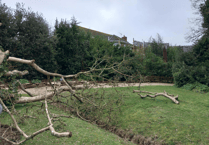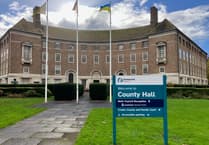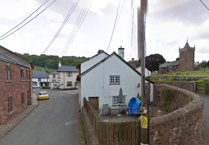FARMERS on Exmoor have been dealt a double whammy of woes this week - their incomes could be slashed in half and the moor is one of the worst areas in the UK for bovine tuberculosis.
While delegates from the national park authority took part in a hill farming crisis meeting in Okehampton on Wednesday, next week authority members will be asked to employ an agricultural consultant to monitor cases of TB on Exmoor.
The consultant will be given the task of finding practical measures to support affected farms rather than trying to find the cause of the disease.
It has been a long-held belief that badgers may spread the disease to cattle but to date there has been no scientific proof.
However, the Ministry of Agriculture is currently carrying out controversial tests throughout the country to try and find out if there is a link by culling badgers in some areas and simply monitoring their numbers and occurrences of TB in others.
A report to Exmoor National Park Authority members for their meeting next week reveals that part of the park is being used by MAFF for the test programme.
But report author, farm liaison officer Kate West, stressed that no badgers would be culled as this was contrary to the authority's policy of protecting and conserving wildlife.
She acknowledged that Exmoor did have a TB problem and warned that if left unchecked the entire landscape of the moor could change forever as farmers were forced to diversify.
She also admitted that many farmers were reluctant to draw attention to the TB problem on the moor, fearing buyers would boycott the area even if the majority of farms remained TB-free.
Her report said: "Exmoor is one of the worst affected areas in the UK and is to be included in scientific trials to investigate how the disease is spreading.
Last year, 45 new cases were confirmed in Somerset compared with less than 30 in the previous year. A substantial proportion of these cases were within West Somerset."
She explained that once a farmer discovered a case of TB in his herd, movement restrictions were placed on all of his animals.
In turn, cattle in the affected herd were banned from being sold on and could only be fattened up for the meat trade.
Mrs West said: "For the majority of Exmoor farmers this means making a significant change to their whole farm business, requiring the investment of time and capital.
"They may have to move away from the breed of cattle they have traditionally used and go for something more commercial.
"They may also have to intensify their grazing regimes, produce more silage, or even turn to arable crops to produce feed.
"In the long term, it could mean a change in the landscape we see today since it is the result of extensive livestock production."
At the authority's meeting on Tuesday, members will be asked to condone MAFF's controversial culling and observation tests and suggest that the Ministry looks into the possibility of testing a TB vaccine on the moor.
They will also be asked to approve plans for a TB study to be carried out through agricultural consultant Barrie Nixon and to ask MAFF to reconsider its policy of withholding suckler cow subsidies from farmers who lose cattle to TB.
The issue of subsidies was also high on the agenda at Wednesday's hill farming meeting in Okehampton.
Around 150 farmers joined representatives from the National Farmers' Union and top figures from both Exmoor and Dartmoor national park authorities to discuss Government proposals for changing the way their support payments are made.
In future, Westminster will calculate how much subsidy a farmer receives, based on how many acres he farms rather than the current system which is based on the number of animals he owns.
In real terms that means farmers in places where arable land is limited, such as Exmoor and Dartmoor, could see their incomes cut by up to a half.
Now the NFU is pressing the Government for a re-think, claiming that some farmers could lose up to £7,000 as a result of the changes.
NFU South West director Anthony Gibson said: "We have to arrive at a solution which is fair to all. It has to be a solution which enhances rather than damages the economy and the environment of the hills."
He accused the Government of trying to slash the payments "by stealth" and claimed that the proposed measures, which were meant to act as a safety net while the changes were imposed, were "full of holes".
NFU policy adviser Peter Morris said: "We have been unable to find a single winner in any of this contrary to Government claims."
The meeting agreed to call on the Government to make an urgent U-turn, while South West MEPs and MPs agreed to write to Agriculture Minister Nick Brown warning of the "dire consequences" of his proposals.
Conservative South West MEP Neil Parish flew back from Brussels especially to attend the NFU-called meeting and accused the Government of "appalling incompetence" and "blatant deception".
He said: "The change from headage payments to area payments was a move that Nick Brown assured the farming community would make only a marginal difference but now the small print in the new announcement reveals a cut of at least ten to 20 per cent.
"This is the final straw for hill farmers and is quite unacceptable."
He said hill farmers in Wales and Scotland were being offered a much better deal than those in the South West and warned that without Government intervention many farms would literally go to the wall.
He added: "I intend to do whatever possible to get this appalling situation rectified - farming has suffered from crisis after crisis and it is unbelievable that the Government stands idly by."



